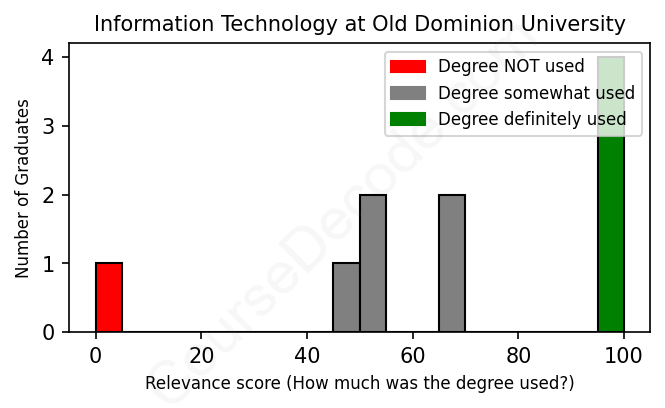
First, some facts. Of the Information Technology graduates from Old Dominion University we've analyzed , here's how many have used (or NOT used) their degree in their career:

These are estimates based on AI analysis of 10 LinkedIn profiles (see below).
The verdict? On par with the average. Overall, with an average relevance score of 67%, Information Technology graduates from Old Dominion University have about the same likelihood of finding work in this field as the average graduate across all fields:
And for comparison, here's the chart for all profiles we've looked at across all degrees.
Also, after graduating, only 0% of these graduates have pursued further education other than another Bachelor's degree (such as a Masters degree or other), compared to the average across all profiles of 35%. This suggests a Bachelors degree is enough for most Information Technology graduates, and it's normal to look for work straight after graduation.
See the details:
|
Relevance score: 97% We think this person has gone into a career highly relevant to their degree. We think this person has gone into a career highly relevant to their degree.
DEGREE INFOGraduated in 2017 from Old Dominion University with a Bachelor of Science - BS in Information Technology. No other secondary education since. JOB HISTORY SINCE GRADUATIONJunior Project Scheduler KSJ & Associates, Inc. Sep 2017 - Nov 2017 Windows 10 Deployment Technician  PenFed Credit Union Oct 2019 - Nov 2019 IT Support Technician  Apple Federal Credit Union Mar 2021 - Present ABOUTI am an IT Support Technician currently employed at Apple Federal Credit Union. I have experience in customer service, service desk support, service desk ticketing, IT technical support, communications, Windows 10 deployment, and troubleshooting various software applications. |
The top 10 most common jobs done by the graduates we've analyzed (ranked most common to least) are:
When looking at the job paths of graduates from Old Dominion University with a degree in Information Technology, it’s clear that there’s a mix of really relevant positions and some that don’t use those IT skills much at all. Many graduates found roles closely tied to their field, like Senior Analyst, Data Intelligence Engineer, and Information Technology Specialist, where their backgrounds in data management, analytics, and IT support really shine. These jobs typically leverage the technical skills learned in their degree program, allowing graduates to apply their knowledge in meaningful ways, whether it’s through programming, database management, or technical support.
On the flip side, some grads ended up in roles like Owner/Photographer or Junior Project Scheduler that don’t really tap into their IT expertise. It's kind of a mix bag. While the IT degree does give them valuable skills, not everyone is landing jobs that focus on technology or require the in-depth knowledge they gained. So, while there are definitely some graduates who are thriving in IT-centric roles, there are also quite a few who seem to be steering their careers in other directions, sometimes leaving their technical education underutilized. Ultimately, it seems like the most relevant positions are more common among those who graduated in the later years, where the roles are increasingly tied to real IT functions and responsibilities.
Here is a visual representation of the most common words in job titles for Information Technology graduates (this is across all Information Technology graduates we've analyzed, not just those who went to Old Dominion University):

Graduates from Old Dominion University with a degree in Information Technology seem to have diverse career trajectories that generally align well with the field. For many, their first jobs after graduation often involve technical support or entry-level IT roles, such as System Administrators or Help Desk Technicians. These early positions provide a solid foundation in practical IT skills, which is crucial for building experience in the industry. As you look at the profiles, you can see some graduates quickly move up the ladder, taking on more complex roles such as Data Engineers or Project Managers within five years, while others have transitioned into specialized positions, like SQL Developers or Technical Support Engineers. This suggests that they are able to leverage their entry-level experiences into more advanced positions fairly quickly.
Even ten years down the line, many alumni from ODU seem to have developed successful careers that are still linked to Information Technology. Graduates are found in roles that reflect upward mobility, such as Manager of Data and Analytics or Senior Analyst positions, which indicate growth and increasing responsibility. However, it’s also notable that there are a few outliers whose careers diverged from IT, like one graduate who has become a photographer. This shows that while a significant number of graduates stick to IT-related fields, some choose to explore very different paths. Overall, the data reflects a healthy career outlook for ODU IT graduates, particularly for those who remain engaged in the technology sector.
Getting a Bachelor’s degree in Information Technology at Old Dominion University, or really anywhere, can be a mixed bag. It’s not the easiest path out there, but it’s also not the hardest. You’ll definitely deal with some challenging subjects like programming, networking, and systems analysis, which can be tough if you’re not super into tech stuff. However, the coursework is designed to be manageable, especially if you keep up with your assignments and ask for help when you need it. So, if you’re someone who enjoys tech and is willing to put in the effort, you’ll probably find it to be a rewarding and totally doable experience!
Most commonly, in the LinkedIn profiles we've looked at, it takes people 5 years to finish a Bachelor degree in Information Technology.
So, looking at these IT grads from Old Dominion University, it seems like they've had a pretty mixed bag when it comes to money. For some, like the 2010 grad who's now a Senior Analyst, it looks like they're making decent cash, especially with their diverse roles in management and analytics. On the other hand, others, especially those in support roles or starting out, might not be raking in the big bucks just yet, like that grad working at a nail salon or the one doing help desk support. Overall, it seems like with a few years of experience, many of them can start climbing the pay ladder, but some are still in entry-level or less lucrative roles. So, it’s kind of like a bit of a roller coaster ride with ups and downs!
Here is a visual representation of the most common words seen in the "about" section of LinkedIn profiles who have a Bachelor degree in Information Technology (this is across all Information Technology graduates we've analyzed, not just those who went to Old Dominion University). This may or may not be useful:

Here are all colleges offering a Bachelor degree in Information Technology (ordered by the average relevance score of their Information Technology graduates, best to worst) where we have analyzed at least 10 of their graduates: